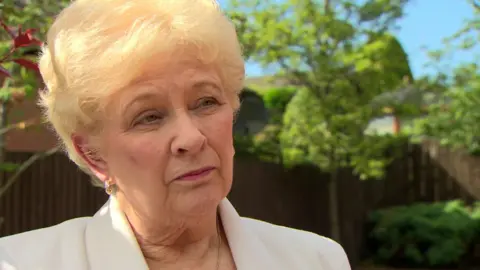NI Troubles: Legacy bill 'not fit for purpose' - Baroness O'Loan
 BBC
BBCA former police ombudsman for Northern Ireland has said controversial new legislation for dealing with Troubles legacy issues is "not fit for purpose".
The bill offers a conditional amnesty to those accused of killings and other Troubles-related crimes.
Baroness O'Loan told BBC News NI's Sunday Politics there had not been any significant amendments made to the bill during committee stage.
The legislation is on course to pass into law before summer.
Last week, Northern Ireland Secretary Chris Heaton-Harris told the Commons the government had been on a journey to improve the bill "dramatically".
He added some "game-changing" amendments would be tabled in the coming weeks.
The bill has been criticised by victims' groups, the Irish government and political parties at Stormont.
It introduces conditional amnesties to perpetrators of Troubles-related crimes if they co-operate with a new truth recovery body known as the Independent Commission for Reconciliation and Information Recovery (ICRIR).
Baroness O'Loan said she cannot understand why Mr Heaton-Harris did not bring any changes to the bill last week.
"He had the opportunity to bring amendments since we started the bill last November," she said.
"There's been nothing game-changing, nothing significant. And I haven't seen anything that suggests there will be.
"I hope it will change dramatically, but I think the bill is not fit for purpose."
'Stop it where it is'
Baroness O'Loan said in order for the bill to be "game-changing" it has to bring back the right to civil actions, the right to prosecute and the right to inquests.
The former ombudsman added she does not think the bill is legally compliant and is "not going to deliver reconciliation".
"People who have been involved in the conflict can seek immunity for their crimes by telling something, but those provisions will not work in the interests of victims," Baroness O'Loan said.
Sir Declan Morgan, a former Lord Chief Justice for Northern Ireland, has been selected to head the ICRIR - an appointment that Baroness O'Loan said should not have happened before the bill was passed.
Having previously paused an amendment she had brought forward, Baroness O'Loan said she intended to "come back with some form of challenge to the bill".
"My view is that once the bill is passed, it's much harder to start dismantling something which is in place," she said.
"So why not stop it where it is? And this is what we need to do."
The Northern Ireland Troubles (Legacy and Reconciliation) Bill will progress to report stage before its third reading in the House of Lords.

What is the legacy bill?
- Legislation that aims to draw a line under the Northern Ireland Troubles by dealing with so-called legacy issues
- The Northern Ireland Troubles (Legacy and Reconciliation) Bill runs to almost 100 pages
- It was introduced last May in an attempt to deal with more than 1,000 unsolved killings
- A central element involves immunity from prosecution for those who co-operate with investigations run by a new information recovery body
- Victims' groups, the Irish government and political parties at Stormont are opposed to the bill, arguing it will remove access to justice for victims and their families
- Veterans Commissioner Danny Kinahan gave the bill a cautious welcome and it is also supported by the Northern Ireland Veterans Movement
- The bill had its second reading in the Lords on 23 November. The government told peers it would bring forward amendments including "a more robust process" around immunity from prosecution
- Lord Caine of the Northern Ireland Office said the ICRIR would be able to conduct criminal investigations
- He said he would be "very, very surprised" if he does not table more amendments to the bill.
